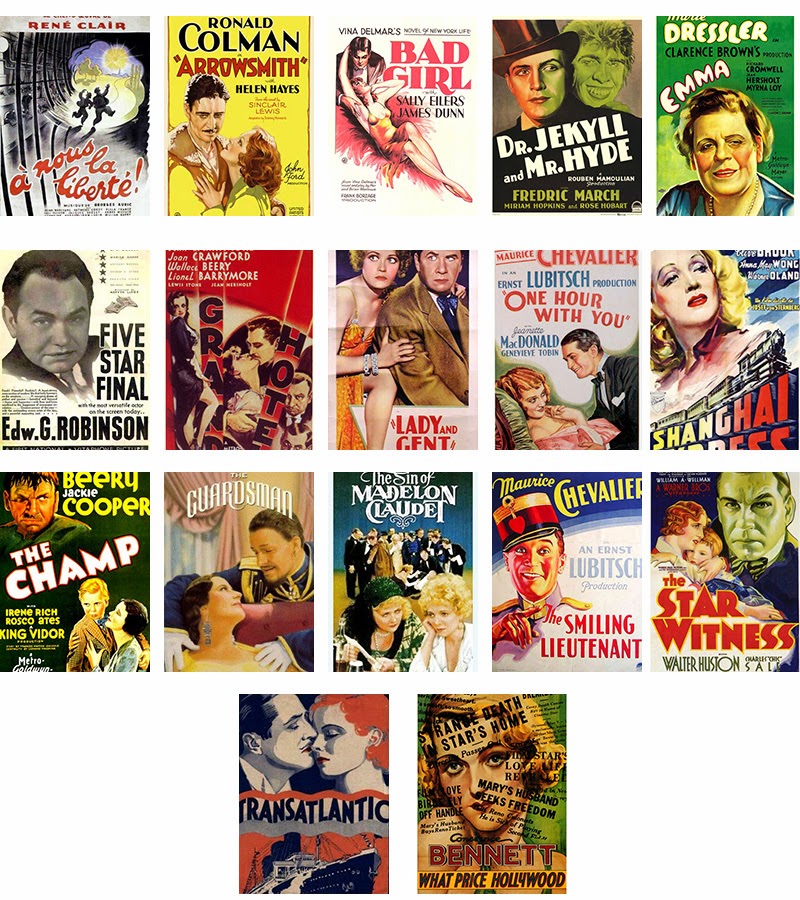I’m not sure
if it’s just me, but one thing I’ve really noticed about this era of cinema –
the late twenties and early thirties – is that women owned the screens. From
Norma Shearer to Gloria Swanson, Janet Gaynor and Clara Bow in previous years,
the fifth Oscars really saw a surge in actresses remembered, imitated and
emulated today. Greta Garbo, Joan Crawford and Marlene Dietrich all made a big
splash this year in diverse and compelling roles, and some now lesser known
stars, Marie Dressler, Helen Hayes, were equally strong. It was a golden era
for women in cinema, and this year’s films gave them meaty roles to sink their
teeth into.
Of course,
there were some great men too – the Barrymores, Fredric March, James Cagney to
name a couple, but the serious commanding presences like William Powell, Cary
Grant, James Stewart, Marlon Brando, Gary Cooper were either still in small or
supporting parts, or still a few years away from stardom.
It makes for
an interesting commentary on the era and, even more so, an interesting point of
reflection from now, where dark, smouldering women were a runaway favourite for
leading roles.
Putting that
aside, this is an interesting year for the Oscars for a few reasons. One it was
the last and only time that a best picture winner would be nominated for no
other award (a crime, to be honest, given the calibre of the winning film, Grand Hotel). It also saw a more
determined swing away from historical and war films and towards romantic
comedies – something that would be a staple for quite a few years to come. This
year three of the eight Best Picture nominees were romantic comedies and many of the other nominees were domestic
or courtroom dramas. This is the first year since the start of the Oscars where
not one war film was nominated, not necessarily a strange fact given the timing
between world wars, but a remarkable one all the same.
While I won’t
be reviewing short films at this time, hey! Short films entered the race this
year with three categories – animated short, comedy short and novelty short.
Also worth noting that this was the last year that Best Sound Recording went to
a studio instead of an individual.
Three Films to Watch
Dr. Jekyll and Mr. Hyde. Maybe it’s my
monster heart speaking, but I really do love this film. It’s one of the earlier
monster films to be nominated, and has some amazing effects and a stirring,
compelling performance from Fredric March in both the titular roles. He goes
for it, and the film is nowhere near as camp as the genre and the era would
allow for. It was dark and gritty before that was a staple of the form.
Shanghai Express. Something you might not know about me – I love train movies. They can condense so
much tension, so much drama through compartments and carriages in a way other
settings struggle to replicate. Snowpiercer,
Strangers on a Train, hell, even Unstoppable.
Shanghai Express does it better than
most, grounded in the remarkable performances of Marlene Dietrich and Anna May
Wong. It’s terrific.
Grand Hotel. It certainly hasn’t been
every year that the Best Picture winner has made this list, but Grand Hotel was one of the relatively
few times that the Academy got it right. From the compelling and interweaving
narrative, to the performance to some of the most impressive cinematography I’ve
seen from this era of heavy cameras, Grand
Hotel pretty much has it all.
Three Films to Miss
Bad Girl. While not a bad film, the sort
of narrative of a young woman and man hating each other and then falling in
love are really a dime a dozen.
One Hour With You. A fun romantic
comedy, but Maurice Chevalier really bothers me as an actor. I find him smug,
which sort of ruins the effect of this would-be charmer.
A nous la liberte. Look, it’s blasphemy,
but I didn’t warm to this French satire on the nature of capitalism at all.


No comments:
Post a Comment